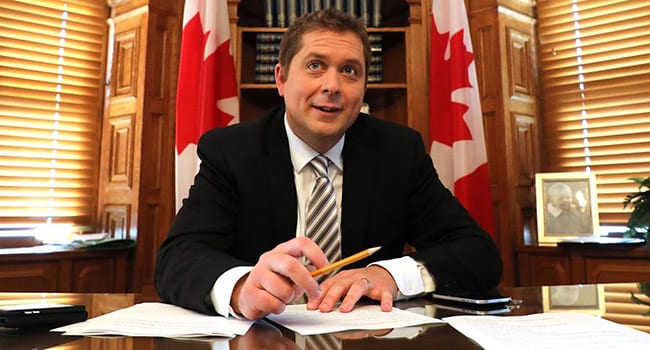 In the end, it’s probably just as well for both the Conservative Party and Canadians that leader Andrew Scheer resigned.
In the end, it’s probably just as well for both the Conservative Party and Canadians that leader Andrew Scheer resigned.
Drawing, quartering and hanging might have been all the rage in the Elizabethan era. But it is, to paraphrase a certain prime minister, 2019, and no one gains today by having public political execution preceded by private party dismemberment.
Scheer’s fate was sealed not so much by the results of October’s election as by his inability in the few weeks after voting day to back-spin the devastating Liberal front-spin about him being unfit for the job.
The Trudeau team began that campaign with the release of a video of Scheer arguing against the legalization of same-sex marriage. It was an outrageous assault on the truth, on Scheer’s privileges as a member of Parliament and on the freedom of Canadians to peacefully disagree on critical social policy.
The video was almost 15 years old. It showed Scheer in the House of Commons addressing what was – back then – highly controversial legislation that a significant percentage of Canadians opposed. In other words, it caught the Saskatchewan MP doing his job.
Neither the Conservatives nor Scheer displayed the remotest capacity to fight back by hammering home the counter message about a Liberal Party in disarray over the SNC-Lavalin scandal, deep fractures within its own cabinet and caucus over the mistreatment of former attorney-general Jody Wilson-Raybould, and the leadership of a prime minister twice found guilty of serious ethical violations.
No. The Conservatives stumbled and staggered through the pre-campaign period – then walked into a baited trap about Scheer’s faith-based opposition to abortion. The best defence they could mount was that the leader’s beliefs were a private matter that he would never impose on Canadians.
That line should have been jettisoned five minutes after it became clear it wasn’t working. A powerful substitute was at hand. It required only that Scheer say something like:
“The Liberals keep wanting to talk about what I won’t do. Let’s talk about what they did do. They imposed an ideological loyalty test on Canadians through the Canada Summer Jobs program that took money from the pockets of young men and women trying to earn tuition for crucially-needed higher education. They then turned around and assaulted the rule of law by interfering in a legal case that sought to bring corporate plutocrats to account for corrupt involvement with the terrorist Gaddafi family. No wonder they want to talk about what isn’t going to happen. It helps them hide what they’ve done.”
Nothing of the sort passed the Conservative leader’s lips. Even without it, he still managed to pick up sufficient seats to put his party within next-election striking distance of the Liberals.
The election aftermath, not the actual campaign failures, should go down in history as one of the most futile efforts ever waged by a Canadian political leader simply to hold on to what he’d already won.
Beyond the relief of being spared watching a party leader’s political blood spilled repeatedly during the three-month eternity of inevitable knifings before the Conservatives’ spring convention, Canadians should feel genuine concern about the long-term result of elevating Scheer’s rookie bungling into alleged bone-deep unfitness for the role. The harm done far transcends any ego wounds or sense of personal injustice he might feel at being forced out.
What has been crushed is the spirit of vivid political dissent.
What has been violated is the democratic entitlement, protected by the Charter of Rights and Freedoms, to peacefully and conscientiously disagree with the fashions of the day while accepting the obligation to govern according to the balance of majority will.
What has been tossed aside is the foundational ideal that parliamentary opposition remains, in our Westminster system, inherently an act of loyalty and so a public good.
What Canadians must hope for now is a successor with both the talent and the tenacity to renew the spirit of dissent, to oppose what merits opposing loyally and well.
Peter Stockland is publisher of Convivium.ca and senior writer at the think-tank Cardus.
Peter is a Troy Media Thought Leader. Why aren’t you?
The views, opinions and positions expressed by columnists and contributors are the author’s alone. They do not inherently or expressly reflect the views, opinions and/or positions of our publication.

